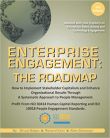Behavior-Based Test Finds Link Between Values and Shopping
A study conducted by market research firm Vrity and BIGtoken, an opt-in based geotracking application, finds that people really do shop based on their values.
Many people say in surveys that an organization’s values help drive their own shopping behavior but is this really true? This study conducted by Vrity, a market research firm, and BIGToken, a permission- based application that tracks actual retail visits finds that values, particularly the way companies treat their employees, has a significant impact on behavior.
Vrity was featured last year in an article in ESM. See: Vrity Helps Brands See Themselves in the Mirror.
 According to the company, it partnered with BIGtoken to ask 3,500 consumers about the values they see in five national retail brands. Then, using the opt-in geotracking on BIGtoken's software, it was able to verify actual store visits during December 2021. According to Jesse Wolfersberger, CEO, “We found that when consumers recognize values such as equality and environmentalism in a brand, they are much, much more likely to shop there. We've productized this system, so we can run this same methodology for any consumer brand and determine how consumers see their values and how much it affects their purchase propensity.”
According to the company, it partnered with BIGtoken to ask 3,500 consumers about the values they see in five national retail brands. Then, using the opt-in geotracking on BIGtoken's software, it was able to verify actual store visits during December 2021. According to Jesse Wolfersberger, CEO, “We found that when consumers recognize values such as equality and environmentalism in a brand, they are much, much more likely to shop there. We've productized this system, so we can run this same methodology for any consumer brand and determine how consumers see their values and how much it affects their purchase propensity.”
“Consumers say they’ll shop where they see a brand doing good for the world. But when they’re not sitting in front of the survey and are deciding where to shop, are they really going to follow through with that?” asks Wolfersberger. “We found that If you can align your values with the consumer, you’re looking at a 60-100% lift in how often that person visits your store. We’re talking major lift, and I was surprised it was that big.”
Vrity tracks values across 20 categories, including equality and environmentalism, but also more of-the-moment ones such as employee empowerment, which addresses how companies treat their employees. “Turns out it does have a high lift, and a big effect on how many people visit the stores. That was surprising but also an encouraging indicator on how consumers are approaching the economy.
The study finds “that people who think a retailer values diversity and equality visited that retailer 84% more often than those they did think do not. People who think the brand is honest and authentic shopped with it 75.7% more often. People who think the brand treats their employees well shop 65.3% more often, and people who think the brand is good for the environment are patrons 64.1% more often. These lifts persist across age, gender, and income levels. Age affects the size of the lift, with people under 35 significantly more likely to shop based on their values.”
The study finds that Costco, which is known for paying employees a $17 minimum wage, saw a significant lift for Vrity’s value category of “Employee Empowerment.” Consumers who recognized Costco as treating their employees well were 287.7% more likely to visit. Kroger, which has made a commitment to sustainability, saw a significant lift in Vrity’s “Environmentalism” category. Consumers who recognized that trait were 147.8% more likely to visit.
According to Wolfersberger, “Vrity’s research stands in contrast to a recent poll conducted by conservative-leaning The Heartland Institute and Rasmussen Reports, which found that American voters believe businesses should focus on traditional business metrics and that a majority of voters who have heard of the Great Reset movement (which incorporates many of the values the Vrity tests for) reject it. Its survey of 1,016 likely voters, completed in early January, finds that 45% of voters believe the highest priority for businesses should be ‘providing individual consumers with high quality products and services at the lowest prices,’ compared to just 1% who say “using business resources to pursue social justice causes.’”
Master the “S” of Environmental, Social, Governance (ESG), A.k.a. Stakeholder Capitalism
The Enterprise Engagement Alliance at TheEEA.org is the world’s first and only organization that focuses on outreach, certification and training, and advisory services to help organizations achieve their goals by fostering the proactive involvement of all stakeholders. This includes customers, employees, distribution and supply chain partners, and communities, or anyone connected to an organization’s success.
Training and Thought Leadership
- Founded in 2008, the Enterprise Engagement Alliance provides outreach, learning and certification in Enterprise Engagement, an implementation process for the “S” or Social of Stakeholder Capitalism and Human Capital Management and measurement of engagement across the organization.
- The Enterprise Engagement Alliance provides a training and certification program for business leaders, practitioners, and solution providers, as well as executive briefings and human capital gap analyses for senior leaders.
- The EEA produces an education program for CFOs for the CFO.University training program on Human Capital Management.
- Join the EEA to become a leader in the implementation of the “S” of ESG and Stakeholder Capitalism.
- The ESM information portal and The Enterprise Engagement Advisors Network solution provider marketplace cover all aspects of stakeholder engagement, and the EEA information library lists dozens of resources.
- The RRN information portal and Brand Media Coalition marketplace address the use of brands for gifting, incentives, recognition, and promotions. The BMC information library provides information and research resources.
Video Learning
The EEA Human Capital Management and ROI of Engagement YouTube channel features a growing library of 30- to 60-minute panel discussions with leading experts in all areas of engagement and total rewards.
- Enterprise Engagement for CEOs: The Little Blue Book for People-Centric Capitalists. A quick guide for CEOs.
- Enterprise Engagement: The Roadmap 5th Edition implementation guide. A comprehensive textbook for practitioners, academics, and students.
Enterprise Engagement Advisory Services
The Engagement Agency helps:
- Organizations of all types develop strategic Stakeholder Capitalism and Enterprise Engagement processes and human capital management and reporting strategies; conduct human capital gap analyses; design and implement strategic human capital management and reporting plans that address DEI (Diversity, Equity, and Inclusion), and assist with managed outsourcing of engagement products and services.
- Human resources, sales and marketing solution providers profit from the emerging discipline of human capital management and ROI of engagement through training and marketing services.
- Investors make sense of human capital reporting by public companies.
- Buyers and sellers of companies in the engagement space or business owners or buyers who seek to account for human capital in their mergers and acquistions.
For more information: Contact Bruce Bolger at Bolger@TheICEE.org or call 914-591-7600, ext. 230.















